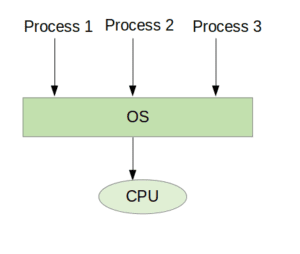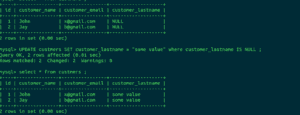In programming, Multitasking and multithreading are two approaches used to reduce the response time and increase the throughput of overall program.
The main difference between them is, one involves execution of multiple processes simultaneously and other one associates with execution of multiple threads of a process concurrently.
Difference Between Multitasking And Multithreading in Java
| Multitasking | Multithreading |
|---|---|
| CPU executes two or more processes at the same time | CPU executes various threads of a particular process simultaneously |
| It involves switching between various processes concurrently | It involves switching between various threads of a single process concurrently |
| Each and every process gets definite resources and a separate memory space | Threads share the same resource and memory space which is occupied for that very process |
| It is slower than multithreading as it puts overhead over CPU | It is faster than multitasking as it don't put much overhead over CPU |
Key differences
- GENERAL
In case of multitasking, the system can perform or execute various activities or programs at the same time, by switching frequently between various tasks that are provided by the user.
In case of multithreading, the system can pay attention or execute the various threads of a particular process simultaneously, which makes the process run more efficiently.
- NATURE OF SWITCHING
In case of multitasking, the switching is performed by the CPU and is performed by rapidly switching between various processes in the time which allotted to each process or program by the CPU.
In case of multithreading, the switching is also performed by the CPU and is performed between the threads of a particular process by switching seamlessly and simultaneously.
- RESOURCE AND MEMORY
In case of multitasking, the process which needs to be executed by the CPU has to be provided with a definitive resource and allocated to a particular memory.
In case of multithreading, the various threads actually share the memory which has been allotted to the complete process beforehand and also share the resources which were reserved for that very process.
4. MULTI PROCESSING
When we talk about Multitasking, then multiprocessing happens to be a part of Multitasking.
But, when we talk about multithreading, then multiprocessing is not a part of the multithreading process.
5. HIERARCHY
If we talk about hierarchy, then the Multitasking phenomenon is above or the parent element for the multithreading phenomenon.
When we discuss the term, Multithreading then this must be kept in mind that it is a subpart of the Multitasking phenomenon.
6. COSTLIER
The Multitasking activities are more costlier than the Multithreading ones because the hardware dependence is more for the multitasking phenomenon which directly increases the cost for efficient performance.
The Multithreading activities are less costlier than Multitasking, this is because these are based on scheduling which is completely based on the software front and can be customized for almost all scenarios.
Multitasking:
When a machine or computer performs a variety of activities such as tasks, programs, etc. simultaneously then, this is termed as Multitasking. Multitasking is performed by allocating small slice of CPU time to each process and switching them back and forth to create the illusion of parallel execution.

In other words, a CPU performs activities for a particular duration and then again changes. This process is so rapid that the user cannot tell any difference.
Each tasks uses memory and other resources. Therefore, multiple tasks put overhead on CPU and if there are too many tasks in execution , the speed of the system gradually slows down.
Multithreading:
A thread is the smallest form of a process and a process can have a varied range of threads.

The process of executing multiple threads simultaneously is known as multithreading. It can be viewed as multitasking at programmatic level. It aims at reducing the execution time of a program and helps in obtaining efficient program
It can be used in a various scenario such as maintaining the responsiveness of application in the long run, parallel execution of two different tasks, handling client’s request in case of the Web application and more.


